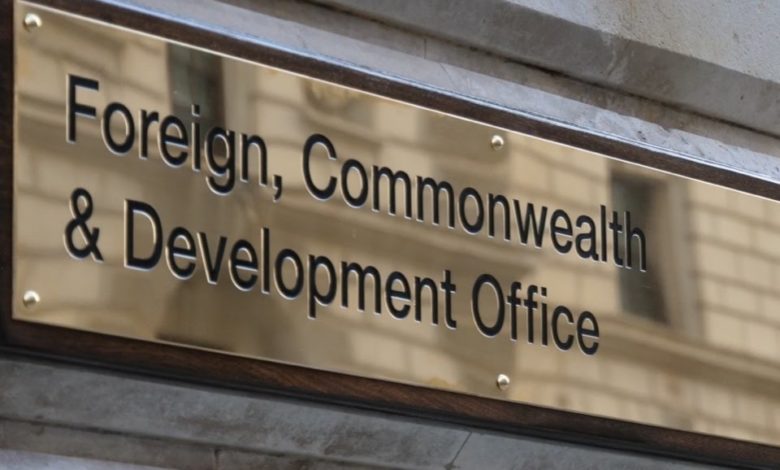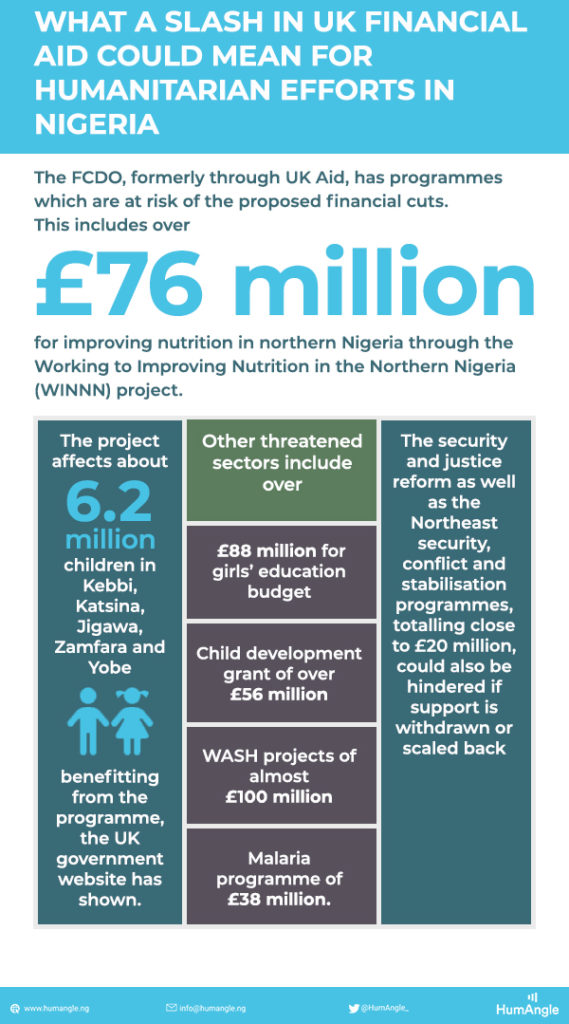What A Slash In UK Financial Aid Could Mean For Humanitarian Efforts In Nigeria
The UK is reportedly planning to reduce its financial aid to several countries, including Nigeria. These cuts, if implemented, will have huge negative impacts on the country’s humanitarian needs.

The United Kingdom’s Foreign and Commonwealth Development Office (FCDO) reportedly plans to slash development aid funding to a number of global south countries, raising concerns over possible implications.
According to the British investigative website, Open Democracy, the move was shared in a leaked email.
The website reported that senior members of the UK government had over the past weeks discussed plans to slash foreign aid by millions in several countries, Nigeria included.
Nigeria’s cut could be as steep as 58 per cent and the Sahel region is due to experience even steeper cuts, as high as 93 per cent.
Other countries expected to be affected by the funding cuts include Syria (67 per cent), Libya (63 per cent), Somalia (60 per cent), Democratic Republic of Congo (60 per cent), South Sudan (59 per cent) and West Balkans (50 per cent).
Nigeria, over the past years, has been heavily dependent on foreign aid from international donors, especially in providing life-saving assistance to the most vulnerable regions.
One of these regions is the Northeast, which has been plagued by violence and humanitarian crises over the past decade.
Data from the United Nations Office for the Coordination of Humanitarian Affairs (UNOCHA) financial tracking service shows that Nigeria received a total of $675.3 million in funding from international donors, with the top three contributors being the United States of America (USA), Germany and the European Union (EU).
About half of the aforementioned amount ($349 million) were allocated to education, food security, health, nutrition and water sanitation hygiene (WASH).
According to the World Bank, as of November 2020, around 83 million Nigerians live below the poverty line, with 53 million vulnerable people. This figure rose exponentially in 2020 due to the COVID-19 pandemic.
The FCDO has been one of Nigeria’s major financial donors in providing maternal and child healthcare, hygiene, sanitation, clean water, education and nutrition as well. The UK donated $23,464,469 to Nigeria in 2020.
The proposed cuts are expected to be felt by millions of people in the country.
UK going against its words
On Sept. 2, 2020, when the UK Foreign Office and the Department for International Development (DFID) merged to form FCDO, a sum of £119 million was committed to fighting COVID-19 for over six million people in Nigeria, the Democratic Republic of Congo (DRC), Somalia, Central African Republic (CAR), Sudan, South Sudan and Yemen.
The aid was also to provide for 240,000 people in Northeast Nigeria for three months.
At the time, concerns were raised that the merging of the two offices would affect the 0.7 per cent allocation of the country’s national income for foreign aid to pay for the UK’s defense and intelligence spending.
When the Secretary of State for Foreign, Commonwealth and Development Affairs, Dominic Raab was asked, he gave the assurance that the allocation would remain the same. This reported slash goes against what Raab said just six months ago.
With the 0.7 per cent allocation written into law, it will require a vote by parliament before the percentage for foreign aid can be reduced, Rishi Sunak, the Chancellor of the Exchequer stated in 2020.
The vote itself has been branded as “unlawful” by a senior law officer, Open Democracy reports.
Sectors that could possibly be affected
The FCDO has been engaging in a number of projects that cut across various sectors since 2006 with the Financial Sector Development Programme.
This had a budget of over £35 million intended to expand access to financial services for the poor.
However, the threat of reduced funding to the humanitarian sector poses very concerning risk, thrusting many people into uncertainty.
The FCDO, formerly through UK Aid, has programmes which are at risk of the proposed financial cuts. This includes over £76 million for improving nutrition in northern Nigeria through the Working to Improving Nutrition in the Northern Nigeria (WINNN) project.
The project affects about 6.2 million children in Kebbi, Katsina, Jigawa, Zamfara and Yobe States benefiting from the programme, the UK government website has shown.
Other threatened sectors include over £88 million for girls’ education budget, the child development grant of over £56 million, the WASH projects of almost £100 million, and the malaria programme of £38 million.
The security and justice reform as well as the Northeast security, conflict and stabilisation programmes, totalling close to £20 million, could also be hindered if support is withdrawn or scaled back.
There has been no confirmation yet on the exact sectors that will be affected by the cuts.
Support Our Journalism
There are millions of ordinary people affected by conflict in Africa whose stories are missing in the mainstream media. HumAngle is determined to tell those challenging and under-reported stories, hoping that the people impacted by these conflicts will find the safety and security they deserve.
To ensure that we continue to provide public service coverage, we have a small favour to ask you. We want you to be part of our journalistic endeavour by contributing a token to us.
Your donation will further promote a robust, free, and independent media.
Donate HereStay Closer To The Stories That Matter





